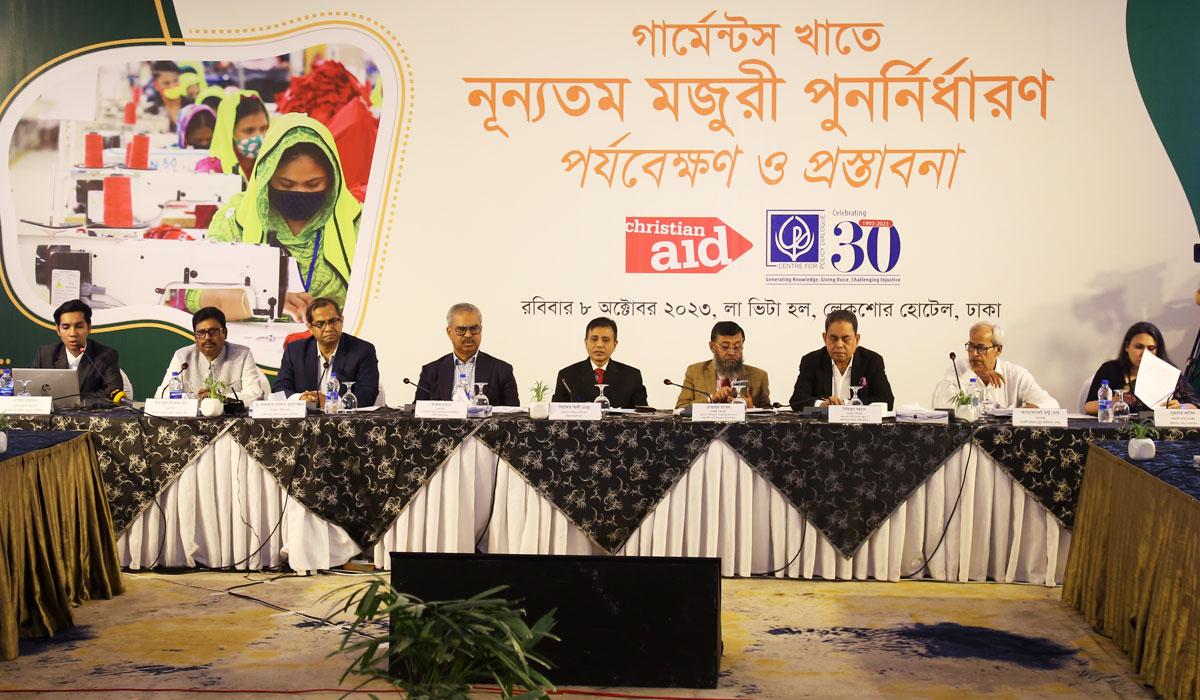
The Bangladeshi Readymade Garments (RMG) sector witnessed an average annual growth of over 5 per cent in real gross value added per worker from 2010 to 2017 and ranked second highest among South Asian apparel-exporting countries. However, despite this growth, the monthly real wage for Bangladeshi RMG workers remained the lowest in South Asia and among the competitors. This disparity persists, as the minimum wage in Bangladesh remains at USD 72.42 per month, retaining its position as the lowest in the region, primarily due to significant currency devaluation amid economic challenges.
The standard family food cost is set at BDT 16,529, but garment workers can only afford to spend BDT 9,198, which covers 56 per cent of the required amount. In fact, for grade 7 workers, the gap is even higher, as they can only spend BDT 5,344 on food. As a result, the workers are forced to abstain from including essential items like eggs, sugar, fruits, and milk in their diets, compromising their access to a healthy nutrition.
In 2023, there has been a 25 per cent increase in the non-food cost for workers’ families, bringing the mean expenditure to BDT 12,882, compared to the 2022 figure of BDT 10,313. The escalating expenses of children’s education have also played a role in driving up the overall non-food costs for workers’ families.
These are some of the findings of the study titled ‘Revision of the Minimum Wage of RMG Workers in 2023: A UNGP perspective’. The objective of the study was to propose a minimum wage for the RMG workers based on the analysis of the performance of key indicators, as well as reviewing the performance of state and enterprises in the process of discussion and negotiation.
Based on this study, the dialogue titled ‘Revision of the Minimum Wage of RMG Workers in 2023’ was organised on Sunday, 8 October 2023 at the Lakeshore Hotel, Dhaka.
In his keynote presentation, Dr Khondaker Golam Moazzem, Research Director, Centre for Policy Dialogue (CPD), proposed the following minimum wage adjustments for different grades — Grade 7 at BDT 17,568, Grades 5 and 6 at BDT 19,310, Grade 4 at BDT 21,808, Grade 3 at BDT 23,533, Grade 2 at BDT 34,603, and Grade 1 at BDT 41,005.
He urged ‘The minimum wage board should reinstate the share of basic wage to at least 55 per cent in the new wage structure’. He added that, instead of specifying a fixed amount, other elements of the wage structure should be established using a percentage-based system.
He recommended that the new minimum wage board should include child allowance in the existing wage structure. They should streamline the wage structure by merging grade 6 and grade 5 while leaving grade 7 and others unchanged.
‘Workers often remain in their positions for extended periods without any promotion’ highlighted Dr Moazzem. Hence, a mandatory time-bound rule should be established for factories to promote workers by grade. Associations, Department of Inspection for Factories and Establishments (DIFE), and Ministry of Labour and Employment (MoLE) can work together in this regard. The DIFE must also provide a report in June 2024, highlighting the implementation status of the new minimum wage.
Mr Tamim Ahmed, Senior Research Associate, CPD, underscored ‘Many factories are not adhering to the grading system, resulting in workers receiving salaries below the minimum wage and missing out on necessary increments’. He proposed the establishment of a tripartite committee within the next three months to oversee and facilitate this process.
While discussing the brands’ role on improving the minimum wage, the Senior Research Associate, said ‘Brands and buyers should express their commitment to the implementation of the new minimum wage by issuing an official letter, which will require increasing the price of the product by 7 cents to adjust the cost proposed minimum wage.’
‘Once the gazette for the minimum wage is published, RMG organisations should promptly communicate its details within the factories. This will ensure that workers are aware of the wage revision and have a clear understanding of their rights.’ said the Chairman of Minimum Wages Board, Mr Liaquet Ali Molla.
Mr Faruque Hassan, President of Bangladesh Garment Manufacturers and Exporters Association (BGMEA), mentioned that factories are currently struggling to operate while also retaining their workforce. The main focus now is on increasing earnings to enable the retention of employees. Although increasing the minimum wage remains a priority, its execution will require more time and effort.
‘Factory owners invested in automation, greening RMG factories and are also attempting to ensure compliance. However, buyers have not raised the product price despite of these efforts.’ said Mr Mohammad Hatem, Executive President, Bangladesh Knitwear Manufacturers and Exporters Association (BKMEA).
Advocate Montu Ghosh, President, Garments Workers’ Trade Union Centre stressed ‘It is crucial to offer training to intermediaries who serve as a link between factory owners and workers, with a specific focus on improving their interactions and behavior towards the workers.’
Mr Md Siddiqur Rahman, Former President, BGMEA, pointed out that higher wages may drive buyers to cheaper markets, potentially causing businesses to lose customers and workers to lose jobs.
‘It is necessary to ensure that the housing rents in the areas where RMG workers reside do not increase following the increase in minimum wage’ said Mr Sirajul Islam Rony, President, Bangladesh National Garments Employees League (BNGWEL).
In the open floor session, the participants emphasised the importance of buyers adopting ethical purchasing practices and being ready to pay higher prices for products. They suggested that a pricing chart for the apparel products should be prepared to understand why the buyers are willing to pay a higher price for the same product from other countries. Additionally, the minimum wage should be increased in a manner that ensures equal benefits for both workers and factory owners, while avoiding the loss of buyers in the process.
High-level policymakers, political leaders, academics, development practitioners, civil society activists, and journalists attended the dialogue and shared their valuable insights.

